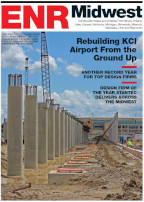
A coal-fired powerplant project in Kansas that has been repeatedly left for dead because of environment-based opposition has received a renewed lease on life from approval by the state’s top environmental regulator. But the plant’s opponents are not discouraged, and they cite many obstacles the project must overcome before ground can be broken.
On May 30, the Kansas Dept. of Health and Environment (KDHE) issued the air quality permit addendum for the 895-MW Holcomb 2 powerplant proposed by Sunflower Electric Power Corp., Hays, Kan., a regional wholesale power supplier. The supercritical coal-fired plant would share the site near Holcomb, Kansas, with the existing 362-MW Holcomb 1 plant. If it is built, it will be one of the largest such plants to be constructed in the U.S. at a time when coal-fired power is losing market share to gas-turbine plants and coal plants are being retired.
The project has been controversial since it was proposed as a 2100-MW expansion with three 700-MW units. It made history in 2007 when KDHE rejected its air permit application because of the harm its carbon dioxide emissions would do to the climate, the first time such justification has been used in the U.S. Gov. Kathleen Sebelius (D) repeatedly vetoed it until she vacated her office to become U.S. Secretary of Health and Human Services. Lt. Gov. Mark Parkinson (D) succeeded her and opened the way for compromises that moved the project forward. It has now been whittled down to a single 895-MW plant costing an estimated $2.8 billion.
The project received a permit in December 2010, but last fall the Kansas Supreme Court ordered the permit revised to higher emission standards. Three days after KDHE approved the amendments to the permit, the U.S. Environmental Protection Agency issued new powerplant emission rules to tighten the standards even further. “We are now evaluating the addendum and deciding how to move forward,” says a Sunflower spokeswoman. The company also is reviewing the EPA rules. She estimates that construction could begin in 48-52 months.
Environmental advocacy group Earthjustice has represented the Sierra Club in opposing the Holcomb 2 project, and is still considering its options, says Amanda Goodin, the attorney for that case. Earthjustice has until the end of June to file a challenge. KDHE has asked that the challenge, if filed, be heard in the Kansas Supreme Court. Even it is approved there, Sunflower will require approval from the Rural Utilities Service to finance the project because Sunflower owes “hundreds of millions” of dollars to RUS for its financing of earlier Sunflower projects, she says. The company will require an environmental impact study to obtain RUS approval, she says, and still must comply with the new EPA rules. “I don’t see them breaking ground for at least a decade,” she says.


Post a comment to this article
Report Abusive Comment